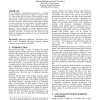Free Online Productivity Tools
i2Speak
i2Symbol
i2OCR
iTex2Img
iWeb2Print
iWeb2Shot
i2Type
iPdf2Split
iPdf2Merge
i2Bopomofo
i2Arabic
i2Style
i2Image
i2PDF
iLatex2Rtf
Sci2ools
124
click to vote
ITS
2000
Springer
2000
Springer
Multi-agent Negotiation to Support an Economy for Online Help and Tutoring
We are designing a computational architecture for a "learning economy" based on personal software agents who represent users in a virtual society and assist them in finding learning resources and peer help. In order to motivate users to participate, to share their experience, offer help and create on-line learning resources, payment is involved in virtual currency and the agents negotiate for services and prices, as in a free market. We model negotiation among personal agents by means of an influence diagram, a decision theoretic tool. In addition, agents create models of their opponents1 during negotiation to predict opponent actions. Simulations have been carried out to test the effectiveness of the negotiation mechanism. An attempt has been made to test the benefits of the proposed economy as a basis for the peer help environment, I-Help. Keywords multi-agent architecture, negotiation, peerhelp system, distributed educational systems, learning economy, personal agents, mo...
| Added | 25 Aug 2010 |
| Updated | 25 Aug 2010 |
| Type | Conference |
| Year | 2000 |
| Where | ITS |
| Authors | Chhaya Mudgal, Julita Vassileva |
Comments (0)

